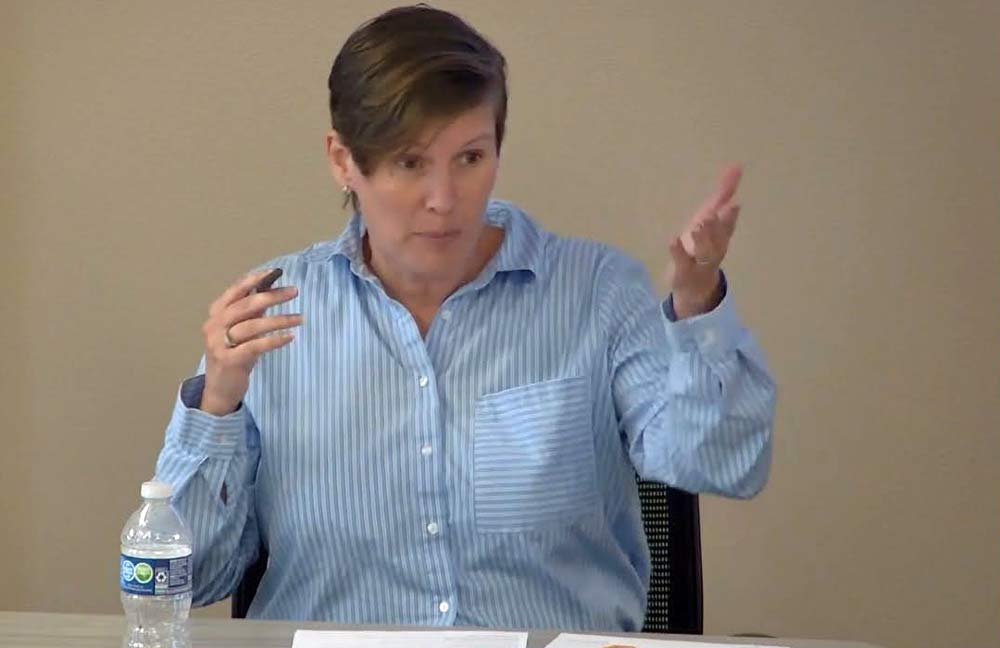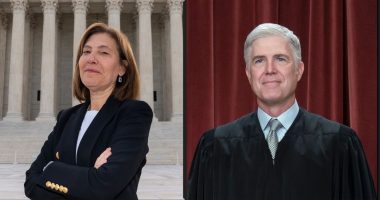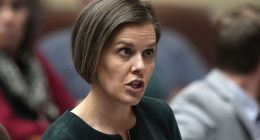
Rookie Flagler County School Board member Sally Hunt–who didn’t bother attending today’s faculty and employee kick-off of the new school year, didn’t bother attending graduation ceremonies for either Matanzas or Flagler Palm Coast High School, didn’t bother showing up at a recent board “retreat” until it was halfway through, and rarely met with the superintendent–may need to bone up on her job.
Hunt does not know how the district’s budget is funded by a state formula. She does not know how the millage, or property tax, is set. She does not know whether to cheer or jeer lower school property taxes, even coming off a budget briefing on July 24, when she voted to approve advertising the budget.
“So I mean, as you guys keep saying, I want to point out it’s the lowest, it’s the lowest,” Hunt said at a budget meeting Tuesday evening, referring to next year’s school property tax rate–again a historic low. “Are we saying Yay? Yay, Flagler County taxpayers? Are we saying boo, state of Florida for not supporting? I guess I–you guys, you know, I’m just trying to figure out, that’s why I say, like, like, let’s talk about what we’re talking about. Because Sally public, I don’t know what we’re talking about right now. So when you say five times, this is the lowest it’s been, I don’t, I don’t like–in a society where we want to either cheer or boo, I don’t know what I’m doing right now. Like, is that bad for us? like, good for taxpayers because they’re not paying as much?”
Most of what Hunt said during that 30-minute meeting was along those lines.
It’s not unusual that new school board members are confused and bewildered by the budget, though they are generally in better command of the subject almost a year into their tenure, and Hunt, like her two other new colleagues on the board (Will Furry and Christy Chong) has recoiled several times at the suggestion that her newness on the board had any bearing on her smarts and savvy. She often stresses how smart she is.
Her command of the budget figures did not appear to be anywhere near the case Tuesday evening at what would otherwise have been a routine meeting, when the School Board approves–ratifies is a more accurate term–the budget it is in most respects forced to accept, since the majority of it is out of the local board’s control.
“We are the only taxing authority that cannot set our millage,” Patty Wormek, the district’s finance director, said. The state Legislature sets the tax rate every year.
It set it at $3.155 per $1,000 in taxable value, a sharp drop from last year’s $3.298, again setting a record for lowest tax rate in recent history. In 1995, the tax rate was just over $7 per $1,000 in taxable value. Lower rates don;t necessarily mean lower revenue, and in every year since the Great Recession, lower rates have generated higher revenue because property values have recovered, and only half the homestead exemption (the first $25,000) applies to school taxes, not the full $50,000 exemption that applies to, say, city and county taxes. Wormeck explained some of the numbers before Hunt chimed in.
“Before we move on, can we just take a second to talk about what we’re talking about for like, millage?” Hunt said. “Is this like, there’s a bucket of property taxes, and this is determining what of that we get, and like the Sheriff’s Office might get a certain percentage, and we get a certain percentage?”
Not exactly. The Sheriff’s Office does not “get” any part of whatever bucket Hunt was referring to. County Commissions are funded by their own property taxes, generating revenue for their general fund, out of which commissions approve and fund the budgets of constitutional officers, among them the sheriff. Constitutional officers are not their own taxing authorities.
Wormeck pointed Hunt to the figure showing taxable values in Flagler County and how that affects the local property tax and what property owners pay.
“So I’m just trying to, in layman’s terms,” Hunt said, “does this mean that, going from a 7 percent in ’95, that more value was placed on education? More funds went to education, and now we’re cutting over half, suggesting that–I just want to talk about what we’re talking about, right? Because it’s like, this is so low. This is so low. What does that mean? If I’m hearing you, is it that–is it state legislators who are not giving as much as they used to? Is it local, who are not giving as much as they used to in percentage to this education?”
Read Related Also: Teen Met Man Online, Fatally Shot Him in Vegas Hotel Room: Police
Wormeck empathized with Hunt, telling her generously that it took her years to understand that while the state sets the tax rate, “I wouldn’t say that someone’s placed some more priority on education or not,” the finance director said. “It’s when we talk about it’s the lowest ever: The point being driven home there is, our property values are going up. We don’t benefit from it because the millage that is set by the state continues to go down.”
In fact, the district has lost state funding over the years, when adjusted for inflation. Ten years ago, the state funded the Flagler district at a rate of $10,000 per student, including capital expenses. By 2022, that was up to $12,465–not much of an increase, especially when adjusted for inflation: in constant dollars, Flagler County had fallen just short of keeping up with inflation: the 2013 allocation equated to $12,867 in 2022, adjusted dollars, so the district lost ground.
The state also eliminated local taxing authority for capital outlay and reduced contributions through Public Education Capital Outlay, or so-called PECO funds, by largely shifting allocations to charter schools.
Board member Colleen Conklin–who does her homework and understands school budgets better than most in the district, and who for years has been sounding the alarm of a state short-changing education–schooled Hunt on the state’s funding formula and local limitations on school taxation. Wormeck added illustrations of her own.
“Yeah, I just, if I’m a member of the public, like I’ve tuned out,” Hunt–the chronic no-show–said, “this is why I think people are so disengaged with government and politics, because you’re talking PECO, and you’re talking– and like, you know, I’m a member of a school board, right?” (It isn’t clear what Hunt meant by a disengaged public: local government meetings for the past several years have been more well-attended, and often raucously so, than in previous years. And Hunt has repeatedly differentiated herself from members of the public by referring to her responsibilities as a school board members.)
Conklin again explained the meaning of the property tax rate, “Because let me tell you something, if that number was going up, people would be in this room,” she said, pointing to an otherwise empty board chamber. “The members of the public who are paying property taxes, when they got their notice in the mail, that’s what they’re looking at. And if that number goes up, people are not happy about it.”
“So you have cheaper taxes, but your schools are not getting potentially funded appropriately,” Hunt said.
“I guess it’s all perspective,” Conklin said. “You would have some members of the public that would say no, we are funded appropriately. You’d have others that would say we’re not and that’s at the discretion of the state, because they set” the tax rate.
“Awesome. I will check out a masterclass on millage,” Hunt said, nine months into her term and at the very meeting–first of two–where board members were voting on next year’s millage. Hunt cast her votes approving the budget and the millage rate she did not understand.
![]()










